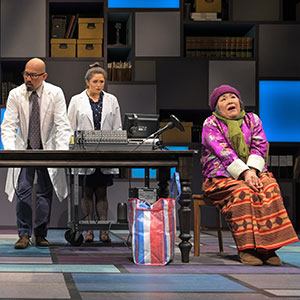
George and Mary know that their marriage is about to end. In the opening scene of Julia Cho’s The Language Archive, George (Jomar Tagatac) asks his wife why she can’t stop cryinga bad sign for both parties.
At first, Mary (Elena Wright) avoids the topic with a deadpan silence. She’s in the middle of tidying up the house and isn’t going to pause for a domestic confrontation. Mary is defensive and reticent with her husband. Then, more aggressively, she simply ends the conversation by walking out of the room. George and Mary aren’t a couple for very long on stage. The play isn’t an in-depth examination of what’s gone wrong between them. The Language Archive instead charts the aftermath of George’s sorrow about being left.
Cho’s dramatic subject is banalwhat makes for an enduring lovebut she’s invented an engaging framework that refreshes an overly familiar narrative trope. George is a linguist who, ironically, can’t speak a language of love that his wife can recognize. In her exasperation, Mary exclaims that she has never understood what he’s been trying to tell her.
However, his assistant at the language archive wants nothing more than to meet him halfway. Emma (Adrienne Kaori Walters) is taking Esperanto lessons because George is fluent in this constructed language whose name means “one who hopes.” Appropriately, Emma is the character in this play with the greatest amount of hope. Her teacher (Emily Kuroda, in one of several roles) sees how heartsick she is, pointing out to her pupil that nobody learns a new language unless it’s for the sake of love.
At the same time that Mary leaves George, he and Emma are in the midst of a new project. They’re recording Resten (Francis Jue) and Alta (Kuroda), the last speakers of a dying language. But things don’t go according to plan. Resten and Alta, a long-married couple, start arguing in English. Their marriage mirrors George’s back to him, except for that their disagreement is temporary. Alta tells Emma that in her native language, the words “I love you” don’t exist. What people in love say to one another is, “Don’t leave me.” Kuroda expresses this thought in such a way that it modifies both phrases. “Don’t leave me” becomes a tender endearment while the inherent need in saying,
“I love you,” is suddenly laid bare.
Cho spends the most time in George’s orbit. In his portrayal of a brokenhearted man, Tagatac quietly conveys George’s wounds, bringing out his character’s dignity. George does indulge in self-pity, but only up to a reasonable stopping point. The audience can see that he’s hopelessly in love with Mary despite his inability to speak in a way that will satisfy her (she’s not interested in his mastery of Esperanto). But the playwright is too polite to bring their sex life into the couple’s dialogues. Instead of directly addressing that topic, Cho and Tagatac imply that George is repressed. He may be a cunning linguist at the office, but not at home. In theory, this might also explain why he can’t see, let alone respond to, Emma’s desire for him.
Cho sacrifices some amount of mystery when she resolves most characters’ plot lines right before the curtain call. Restin and Alta’s has a tidy ending, and Mary’s landed on her feet and found a sense of purpose (hint: she’s transformed her needs into kneads).
Emma takes a more interesting journey, embarking on a surreal train ride that brings her face to face with Ludwik Zamenhof (1858Ð1917), the Polish physician who invented Esperanto. Unlike Mary, her journey isn’t toward independence but understanding the man she loves, even if he’s unable to understand her way of saying, “I love you.”
The reviewed performance was a preview.
The Language Archive
Thru Aug 4, $35+
Lucie Stern Theatre
theatreworks.org


